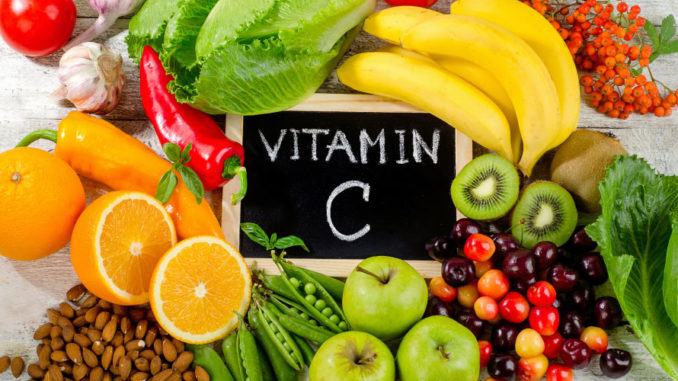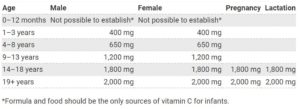
Table of Contents
What is Vitamin C?
- Vitamin C, also known as ascorbic acid, is a water-soluble vitamin that occurs naturally in some foods, is added to others, and can be obtained as a dietary supplement.
- Vitamin C is an essential vitamin that must be consumed regularly in the diet.
- Vitamin C (ascorbic acid) is a nutrient that our body needs to form blood vessels, cartilage, muscle and collagen in bones.
- Vitamin C is also important for the body’s healing process.
- Vitamin C also acts as an antioxidant that helps to protect our cells against the effects of free radicals
- As vitamin C dissolves in water and is transported to the body’s tissues, but is not effectively stored and cannot be produced endogenously, it must be consumed daily through food or supplements.
- Even before its discovery in 1932, nutritionists realized that citrus fruits contained something that may prevent scurvy, a disease that killed up to two million sailors between 1500 and 1800.
- Vitamin C is also essential for the wound healing process in our bodies.
Sources of Vitamin C
Fruits and vegetables rich in Vitamin C are:
- Citrus (gooseberries, oranges, kiwi, lemon, grapefruit)
- Bell pepper
- Strawberries
- Tomatoes
- Cantaloupe
- Cruciferous plants (broccoli, Brussels sprouts, cabbage, cauliflower)
- White potatoes
- Blackcurrants
Functions
All of the tissues in our body require vitamin C for growth and repairment. It is used to:
- Form an important protein that goes into the formation of blood vessels, tendons, skin, and ligaments
- Wound healing and formation of scar tissues
- Repair and maintenance of the teeth, bones, and cartilage
- Help with iron absorption
- One of the numerous antioxidants is vitamin C. A portion of the damage produced by free radicals like cancer is halted by antioxidants
Recommended Dietary Allowance (RDA)
- For people aged 19 and older, the recommended daily allowance (RDA) of Vitamin C is 90 mg for males and 75 mg for women
- The dosage rises to 85 mg and 120 mg daily for pregnancy and lactating, respectively
- An additional 35 mg of vitamin C over the RDA is advised for smokers since smoking might reduce the body’s vitamin C levels
Recommended Dietary Allowance of Vitamin C:

Tolerable Upper Intake Level of Vitamin C:

Overdose of Vitamin C
Overdose of Vitamin C i.e. intake more than 1000 mg/day can lead to:
- Stomach pain
- Diarrhea
- Flatulence
Health Benefits
- Vitamin C is a powerful antioxidant that can increase the antioxidant levels in our blood. This might lower the likelihood of developing chronic diseases like heart disease.
- People with high blood pressure and adults in good health have both showed a reduction in blood pressure while taking vitamin C supplements.
- The risk of heart disease has been shown to be lower in people who take vitamin C supplements. High blood levels of LDL (bad) cholesterol and triglycerides are two risk factors for heart disease that these supplements may help to reduce.
- Vitamin C-rich foods and supplements have been associated to decreased uric acid levels in the blood and a lower risk of gout.
- Vitamin C helps increase the absorption of iron that is poorly absorbed, such as iron from vegetarian sources. Additionally, it may lessen the chance of iron deficiency.
- White blood cell activity, skin protection, and wound healing are all improved by vitamin C, which may also increase immunity.
- A high intake of vitamin C from foods and supplements has been shown to have a protective impact, whereas low vitamin C levels have been associated to an increased risk of memory and cognitive problems like dementia.
Additionally, research evidences also reveal the health benefits of Vitamin C on following conditions:
- Cancer: Intake of diet rich in fruits and vegetables may lower the risk of different types of cancer like breast, colon and lung cancers.
- Common cold: Diets rich in Vitamin C are effective enough to prevent against the common cold, its duration and severity.
- Eye diseases: Oral vitamin C supplements in combination with other vitamins and minerals seem to prevent age-related macular degeneration (AMD) from worsening. Likewise, a higher level of Vitamin C also lowers the risk of developing cataracts.
Signs and Symptoms of Vitamin C Deficiency
These are a few of the initial symptoms of vitamin C deficiency:
- Joint and muscle pain
- Little bruise-like reddish-blue patches on skin
- Weakness and fatigue
- Easy bruising formation
While they are not the most obvious low vitamin C symptoms, there are some of the most noticeable and advanced symptoms of Vitamin C deficiency. They are:
- Loss of weight
- Damaged and parched skin
- Hair split ends
- Iron deficiency anemia due to decreased absorption of non-heme iron
- Gum edema, bleeding and discoloration leading to eventually loss of teeth
- Delayed healing of skin wounds
These symptoms might cause catastrophic problems including bleeding around the heart and brain hemorrhage if not handled.
Consequences of Deficiency
- Adults have vitamin C deficient symptoms after weeks or months of vitamin C loss.
- Early symptoms include drowsiness, weakness, irritability, weight loss, and hazy myalgia and arthralgia.
- Scurvy symptoms appear after a few months of deficiency.
- Perifollicular hemorrhages, coiled hair, and follicular hyperkeratosis can all appear.
- Gums that are severely deficient may swell up, turn purple, become spongy and friable, and bleed easily. Teeth eventually get avulsed and become loose.
- One might have secondary infections.
- Spontaneous hemorrhages can happen, particularly in the form of bulbar conjunctival hemorrhage or ecchymoses on the skin of the lower limbs.
- Wounds heal slowly and tear readily.
- Other symptoms and signs include lower extremity edema, severe bleeding or effusions inside joints, and femoral neuropathy brought on by hemorrhage into the femoral sheaths.
- In infant, symptoms include anorexia, irritability, and discomfort during movement, and decreased development. Bone development is hampered in children and newborns, and bleeding and anemia are possible side effects.
Groups/Persons At High Risk of Vitamin C Deficiency
Passive “smokers” and smokers
- Smokers use up vitamin C more quickly than non-smokers, which cause body to produce free radicals more quickly, resulting in lower amounts of vitamin C in your blood than non-smokers.
Infants fed evaporated or boiled milk
- Because cow’s milk naturally contains very little vitamin C and because heat can degrade vitamin C, this practice could result in vitamin C deficiency.
Individuals with limited food variety
- People who consume a restricted variety of foods, such as those elderly, indigent persons who cook for themselves, people who abuse alcohol or drugs, food faddists, people with mental illnesses, and occasionally children, may not get enough Vitamin C.
Individuals with certain chronic conditions and mal-absorption
- Some conditions might make it harder for the body to absorb vitamin C.
- Cachexia or significant intestinal mal-absorption may raise the risk of vitamin C deficiency in certain cancer patients.
- Patients receiving continuous hemodialysis for end-stage renal disease may also have low vitamin C concentrations.
- People with certain gastrointestinal conditions or certain types of cancer are also more likely to have Vitamin C deficiency.
References and For More Information
https://www.webmd.com/diet/features/the-benefits-of-vitamin-c
https://www.nhs.uk/conditions/vitamins-and-minerals/vitamin-c/
https://www.mayoclinic.org/drugs-supplements-vitamin-c/art-20363932
https://medlineplus.gov/ency/article/002404.htm
https://ods.od.nih.gov/factsheets/VitaminC-HealthProfessional/
https://www.healthline.com/nutrition/vitamin-c-benefits
https://www.msdmanuals.com/professional/nutritional-disorders/vitamin-deficiency,-dependency,-and-toxicity/vitamin-c-deficiency
https://www.ncbi.nlm.nih.gov/books/NBK493187/#:~:text=Risk%20factors%20for%20deficiency%20include,countries%2C%20overt%20scurvy%20is%20rare
https://www.healthline.com/nutrition/vitamin-c-foods#TOC_TITLE_HDR_5
https://www.webmd.com/diet/foods-high-in-vitamin-c